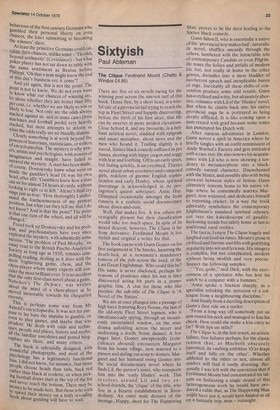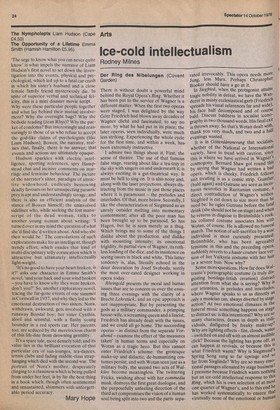Sixtyish
Paul Ableman
The Clique Ferdinand Mount (Ghetto & Windus £4.95) There are five or six novels racing for the winning post across the uneven turf of this book. Home first, by a short head, is a wist ful tale of a provincial lad trying to reach the top in Fleet Street and happily discovering, before the birth of his first ulcer, that life can be sweeter at more modest elevations. Close behind it, and my favourite, is a bril liant satirical novel, studded with epigram and smart metaphor, about news and the men who hound it. Trailing slightly is a sureal, Sixties black comedy suffused in pot fumes, droning with hippy jargon and soggy with fear and loathing. Off to an early spurt, but fading quickly, is an overbred, Thirties novel about urban eccentrics and composed girls, redolent of gnomic English sophistication and early Huxley, whose spiritual parentage is acknowledged in its protagonist's quaint sobriquet: Antic Hay. Glimpsed occasionally amongst the front runners is a realistic social documentary about down-and-outs.
Well, that makes five. A few others are vestigially present but their classification would take too much space. In spite of its mixed descent, however, The Clique is far from derivative. Ferdinand Mount is too stylish and original a writer for that.
The book opens with Gunn Goater on his first assignment in The Smoke, haunting the death-bed, at a newsman's mandatory remove of the pub across the road, of the Last Great Englishman. Who could this be? His name is never disclosed, perhaps for reasons of prudence since his son is later discovered acting bit parts in a pornographic film. A clue for those who like puzzles: the sub-title of The Clique is 'A Novel of the Sixties'.
We are at once plunged into a passage of high farce featuring Rory Noone, the last of the old-style Fleet Street legmen, who is simultaneously spying, through an incautiously uncurtained window, on -the state drama unfolding across the street and undressing a docile Norse damsel. A few pages later, Goater unexpectedly (coincidences abound) encounters Margaret from his home village, now married to a parson and doling out soup to dossers. Margaret and her husband swing Goater into the social documentary novel where he finds Lil, the parson's sister, who transports him into the 'early Huxley' work. This revolves around Lil and two exschool-friends, the 'clique' of the title, who live in a bizarre establishment in Brondesbury. An outre male denizen of the menage, Happy, short for The Happening on a fantastic trip, man — outasight. Man, s black comedy.ctoombeedtyhe door leading to the suc Gunn himself, who is essentially a native of the 'provincial boy makes bad', naturalistic novel, shuffles uneasily through the others, lumbered with the intractable role of contemporary Candide or even Pilgrim. He tours the follies and pitfalls of modern life but, not really at home in the other genres, dwindles into a mere bladder of incoherent speech and inexplicable bursts of rage. Inevitably all these shifts of convention produce some odd results. Gunn has a stylized and witty, but ultimately abortive, romance With Lil of the 'Huxley' novel. But when he climbs back into his native provincial saga he is portrayed as being deeply afflicted. It is like coming upon a man crazed with grief because some rotter has punctured his Dutch wife.
After various adventures in London, Gunn serves a spell in America where he briefly tangles with an outfit reminiscent of Andy Warhol's Factory and gets intricated with a race riot. He also renews his acquaintance with Lil who is now showing a tendency to metamorphose into a blackcomedy surreal character. Disenchanted with the States, and possibly also with being cross-cut between styles of fiction, Gunn ultimately retreats home to his native village where he contentedly marries Margaret, now widowed, and dedicates himself to reporting cricket. In a way the book admirably symbolizes the contemporary Englishman's standard spiritual odyssey, out into the kaleidoscope of gaudilybeckoning trends but safely home at last to traditional rural verities.
The fact is, I enjoy The Clique hugely and laughed out loud six times. Mount's prose is civilized and literate and lifts with gratifying regularity into wit and lyricism. His imagery is complex, but not complicated, modern without being modish and very precise. Inspect the following samples: '"Yes, quite," said Dick, with the nervousness of a spectator who has lent his watch to a conjurer with a hammer.'
'Antic spoke a fraction sharply, as a specialist rebuking the intrusion of a colleague from a neighbouring discipline.'
And finally from a dazzling description of Gunn's first ride on a reefer: 'From a long way off somebody put an arm round his neck and managed to kiss his cheek. How could she make a kiss carry so far? With lips on stilts?'
The Clique is, in the last resort, an artistic failure, five failures perhaps, for the classic reason that, as Macbeth obscurely lamented, its vaulting ambition 'O'er-leaps itself and falls on the other'. Whether addicted to the other or not, almost all readers will find it vastly diverting. Personally 1 was left with the conviction that if Ferdinand Mount had concentrated his talents on fashioning a single strand of this heterogeneous work he would have produced a cable that, as The Happening Man might have put it would have hauled us all The Nympholepts Liam Hudson (Cape Arts £4.50) The Opportunity of a Lifetime Emma Smith (Hamish Hamilton £5.95) 'The urge to know what you can never quite know' is what impels the narrator of Liam Hudson's first novel to set down the investigation into the events, physical and psychological, which led up to a fatal car crash in which his sister's husband arid a close female family friend mysteriously die. In spite of superior verbal and technical felicity, this is a mini disaster movie script. Why were these particular people together and what lay behind their mutual involvement? Why the overnight bags? Why the bedside reading (Jean Rhys)? Why the packet of condoms? But interestingly and reassuringly to those of us who refuse to accept the god-like claims of psychologists (like Liam Hudson), Bowen, the narrator, realises that, finally, there is no answer; that events and actions are ultimately opaque.
Hudson sparkles with electric intelligence, sporting references, spry Hampstead chat and incisive comments on marriage and feminine behaviour. The picture of the narrator's sister, paradigm of attractive widowhood, endlessly bestowing deadly favours on her unsuspecting parastic prey is apt and understandingly savage; and there is also an efficient analysis of the stance of Bowen himself; the uninvolved sideliner who, while seeking the lost manuscript of the dead woman, talks to another young woman about writing: turned over in my mind the question of what she'd find she'd written about. And who she then would be.' The convolutions of such explorations make for an intelligent, though trendy effort, which exudes that kind of multi-disciplinary telly coruscation which is attractive but ultimately intellectually light-weight.
'It's no good to have your heart broken, is it?' asks one character in Emma Smith's novel, `and your back and your wind broken — you have to know why they were broken, don't you?' So, another exploratory novel, tracing the far-gone events of one summer in Cornwall in 1937, and why they led to the emotional destruction of two sisters. Nora, withdrawn, awkward, gets involved with a runaway Borstal boy; her sister Cynthia, aloof and scornful, with a flashy young bounder in a red sports car. Her parents, too, are seduced by the meretricious charm of this life-line from drowning gentility.
It's a spare tale, most densely told; and its value lies in the brilliant evocation of that particular era of sun-lounges, tea-dances, tennis clubs and fading middle-class straphanging which died with the second war. The portrait of Nora's mother, desperately clinging to a classiness which is being pulled from under her feet, is by far the best thing in a book which, though often sentimental and unsustained, shimmers with unforgettable period accuracy.
Mary Hope



































 Previous page
Previous page